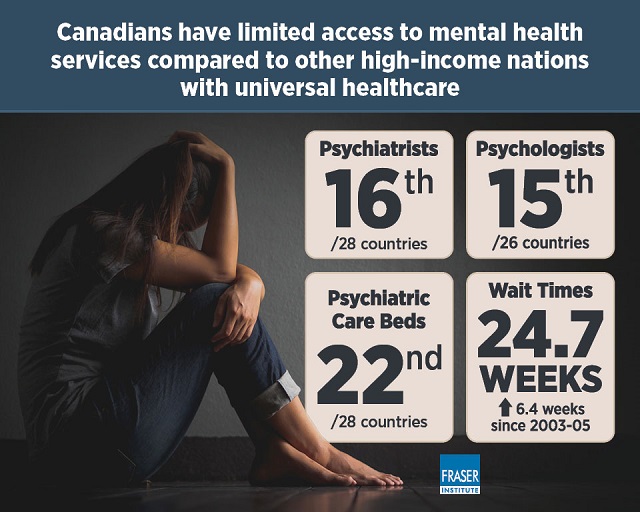Community
Mental Health Crisis as Canada ranks poorly in access to services

From the Fraser Institute
A new report, Mental Health Care: How is Canada Doing? compares Canada’s mental health services to other countries with universally accessible health care and finds that, despite the Canadian government spending a larger share of health dollars on mental health services, Canada has relatively fewer psychiatric care beds (ranking 22nd out of 28 nations), psychiatrists (ranking 16th out of 28 nations), and psychologists (ranking 15th out of 26 nations) in addition to growing wait times.
Canada ranks 22nd out of 28 countries with universally accessible health care on psychiatric care beds
Canadians endure relatively poor access to mental health services when compared to what is available in other developed nations with universal access health care systems, particularly for psychiatric care beds, psychiatrists and psychologists, finds a new study released today by the Fraser Institute, an independent, non-partisan Canadian public policy think-tank.
“Making better use of limited resources, with a focus on improving the availability of services over time, will be essential to properly address Canada’s mental health care gap,” said Nadeem Esmail, senior fellow at the Fraser Institute and author of Mental Health Care: How is Canada Doing?
The study compares Canada’s mental health services to other countries that, like Canada, have universally accessible health care. It finds that Canada has relatively fewer psychiatric care beds (ranking 22nd out of 28 nations), psychiatrists (ranking 16th out of 28 nations), and psychologists (ranking 15th out of 26 nations). And wait times to access mental health services have grown in Canada from 18.3 weeks in 2003-05 to 24.7 weeks in 2020-22.
The study notes a lack of access to appropriate treatments, low rates of posthospitalization follow up, relatively poor access to care in rural areas, and general practitioner physician preparedness for dealing with mental health conditions and mental illness as shortcomings of the Canadian approach.
“Canada’s relatively poor record on mental health services—and growing wait times—have occurred in spite of Canadian governments spending a larger share of health dollars on mental health services than governments in comparable countries,” Esmail said.
Click here to see the Executive Summary
Click here to read the Full Report
Community
Support local healthcare while winning amazing prizes!

|
|
|
|
|
|
Community
SPARC Caring Adult Nominations now open!

Check out this powerful video, “Be a Mr. Jensen,” shared by Andy Jacks. It highlights the impact of seeing youth as solutions, not problems. Mr. Jensen’s patience and focus on strengths gave this child hope and success.
👉 Be a Mr. Jensen: https://buff.ly/8Z9dOxf
Do you know a Mr. Jensen? Nominate a caring adult in your child’s life who embodies the spirit of Mr. Jensen. Whether it’s a coach, teacher, mentor, or someone special, share how they contribute to youth development. 👉 Nominate Here: https://buff.ly/tJsuJej
Nominate someone who makes a positive impact in the live s of children and youth. Every child has a gift – let’s celebrate the caring adults who help them shine! SPARC Red Deer will recognize the first 50 nominees. 💖🎉 #CaringAdults #BeAMrJensen #SeePotentialNotProblems #SPARCRedDeer
s of children and youth. Every child has a gift – let’s celebrate the caring adults who help them shine! SPARC Red Deer will recognize the first 50 nominees. 💖🎉 #CaringAdults #BeAMrJensen #SeePotentialNotProblems #SPARCRedDeer
-

 2025 Federal Election2 days ago
2025 Federal Election2 days agoThe Federal Brief That Should Sink Carney
-

 Media1 day ago
Media1 day agoCBC retracts false claims about residential schools after accusing Rebel News of ‘misinformation’
-

 John Stossel2 days ago
John Stossel2 days agoClimate Change Myths Part 2: Wildfires, Drought, Rising Sea Level, and Coral Reefs
-

 Bjorn Lomborg1 day ago
Bjorn Lomborg1 day agoNet zero’s cost-benefit ratio is CRAZY high
-

 2025 Federal Election1 day ago
2025 Federal Election1 day agoMark Carney Wants You to Forget He Clearly Opposes the Development and Export of Canada’s Natural Resources
-

 2025 Federal Election1 day ago
2025 Federal Election1 day agoPolice Associations Endorse Conservatives. Poilievre Will Shut Down Tent Cities
-

 2025 Federal Election1 day ago
2025 Federal Election1 day agoCarney’s Hidden Climate Finance Agenda
-

 Alberta2 days ago
Alberta2 days agoLow oil prices could have big consequences for Alberta’s finances






